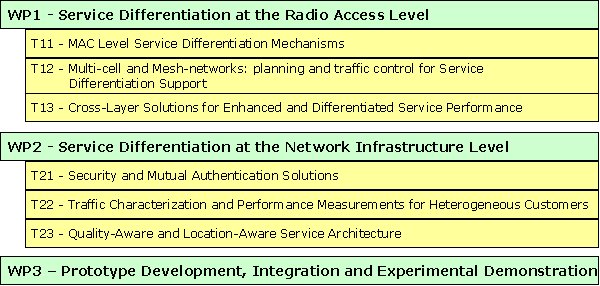![[Italian]](images/uk.gif) |
|
|  | Project description |
|
|
|
|
|
|
|
|
|
|
|
|
Project description
The acronyms WLAN and even more WiFi, today, mean much more than simple cable replacement.
They imply the concrete possibility to deploy innovative and unforeseen applications, devised to dramatically change the way mobile and roaming users work and live, in both private and public environments.
One of the present challenges of WLANs is offering a portfolio of wireless mobile services, which might compete with (or integrate) that provided by 3G networks. Indeed, a large number of technical challenges lay behind this evolution. These encompass issues at several levels, ranging from high data rate PHY layer enhancements and support for Smart Antennas, up to support of priority mechanisms at the MAC layer, up to design and provisioning of location-aware services and service creation environments. Dealing
with public spaces and commercial service offering, the keyword is provisioning differentiated levels of service. Service differentiation not only implies prioritised delivery mechanisms for different traffic classes (and users!), and support of quality of
service objectives, but it also requires meeting the context-aware and location-aware service needs, as well as providing differentiated levels of security.
Technological advances in the physical layer (802.11a/g) made it possible to transmit at rates up to 54 mbps. However, high data rates alone are not sufficient for QoS support. This research project is devised to explore and demonstrate solutions for differentiated service provisioning and quality of service support in a complex and realistic 802.11 network. The project address the two distinct level of 802.11 networks: the radio access level and the network infrastructure level. In fact, service differentiation not only implies prioritized delivery mechanisms for different traffic (and paying users!) classes. It also requires satisfaction of different service needs and security requirements, as well as the possibility to deploy per-customer differentiated applications that may take advantage of additional “context” information, including user profile and location.
At the radio access level, the aim is twofold. On the one hand, it targets assessing the performance of currently proposed service differentiation mechanisms in the 802.11e task group. On the other hand, seeking, design and evaluate solutions (maybe relying on cross-layer optimization) going beyond the current proposals is the creative part of the project. Advanced traffic control, the support of space-division multiple access and Smart Antennas (a key hot topic in the extremely recent high data rate standardization evolutions carried out in the 802.11n task group), 802.11 multi-cell network planning and (self-)configuration, and traffic balancing and control in multi-hop and mesh-networking are all topic that still need fundamental research and that will be addressed in the project.
At the network level, the aim is the definition of secure and viable service architectures devised to provide differentiated and personalized service offering to heterogeneous network customers, and do it on a secure communication infrastructure. To this purpose, we will study and propose architectures for context-aware, location-aware and quality-aware services, mechanisms to locate services, authentication solutions devised to operate in a scenario characterized by several, (possibly independent) HotSpot
providers, and security mechanisms at various layers appropriate for different user categories.
Finally, a primary project goal is the development of: i) an enhanced 802.11 NIC card supporting a custom FPGA implementation of a service-differentiation-enhanced MAC layer; ii) a nation-wide demonstration test-bed, composed of access networks placed at different research unit sites, and interconnected via the national IP backbone. With this test-bed, we pursue the challenging result of demonstrating new service provisioning/business models on a large-scale national basis Moreover, each local access network will specifically demonstrate selected project topics, such as Wireless Distribution Service, TCP optimization, Router Access Point with channel-quality-aware IP scheduling, VPN and IPsec security solutions, etc.
Project Organization
The project is organized in two research work-packages plus a third devoted to experimentation and demonstration with the general structure outlined below and the details specified in the pages
dedicated to the WP1, WP2, and WP3.

|
|

![[Italian]](images/uk.gif)



